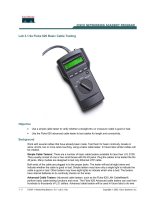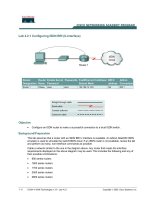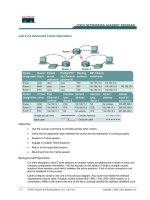Tài liệu Lab 4.2.9a Fluke 620 Cable Tester – Wire Map pptx
Bạn đang xem bản rút gọn của tài liệu. Xem và tải ngay bản đầy đủ của tài liệu tại đây (91.53 KB, 3 trang )
1 - 3 CCNA 1: Networking Basics v 3.0 - Lab 4.2.9a Copyright 2003, Cisco Systems, Inc.
Lab 4.2.9a Fluke 620 Cable Tester – Wire Map
Objective
• Learn the wire mapping features of the Fluke 620 LAN CableMeter or its equivalent.
• Learn how to use a cable tester to check for the proper installation of unshielded twisted- pair
(UTP) Category 5 according to TIA/EIA-568 cabling standards in an Ethernet network.
Background / Preparation
Wire maps can be very helpful in troubleshooting cabling problems with UTP cable. A wire map
allows the network technician to verify which pins on one end of the cable are connected to which
pins on the other end.
Prior to starting the lab, the teacher or lab assistant should have several correctly wired CAT 5
cables to test. The cables should be both straight-through and crossover. There should also be
several CAT 5 cables created with problems such as poor connections and split pairs to test. Cables
should be numbered to simplify the testing process and to maintain consistency. A cable tester
2 - 3 CCNA 1: Networking Basics v 3.0 - Lab 4.2.9a Copyright 2003, Cisco Systems, Inc.
should be available that can test at least continuity, cable length, and wire map. Work individually or
in teams. The following resources will be required:
• CAT 5 straight-wired cables of different colors
• CAT 5 crossover-wired cable, which isT568A on one end and T568B on the other
• CAT 5 straight-wired cables with open wire connections in the middle or one or more conductors
shorted at one end of different colors and different lengths
• CAT 5 straight-wired cable with a split pair mis-wire
• Fluke 620 LAN CableMeter or similar to test cable length, continuity, and wire map
Step 1
Turn the rotary switch selector on the tester to the WIRE MAP position. Press the SETUP button to
enter the setup mode and observe the LCD screen on the tester. The first option should be CABLE.
Press the UP or DOWN arrow buttons until the desired cable type of UTP is selected. Press ENTER
to accept that setting and go to the next one. Continue pressing the UP/DOWN arrows and pressing
ENTER until the tester is set to the following cabling characteristics:
Tester Option Desired Setting – UTP
CABLE: UTP
WIRING: 10BASE-T or EIA/TIA 4PR
CATEGORY: CAT 5
WIRE SIZE AWG 24
CAL to CABLE? NO
BEEPING: ON or OFF
LCD CONTRAST From 1 thru 10 (brightest)
Step 2
For each cable to be tested use the following procedure. Place the near end of the cable into the RJ-
45 jack labeled UTP/FTP on the tester. Place the RJ-45-RJ-45 female coupler on the far end of the
cable, and then insert the cable Identifier into the other side of the coupler. The coupler and the
cable identifier are accessories that come with the Fluke 620 LAN CableMeter.
Step 3
Using the tester Wire Map function and a Cable ID Unit, the wiring of both the near and far end of the
cable can be determined. The top set of numbers displayed on the LCD screen is the near end, and
the bottom set is the far end. Perform a Wire Map test on each of the cables provided. Then fill in the
following table based on the result for each CAT 5 cable tested. For each cable, write down the
number and color, whether the cable is straight thru or crossover, the tester screen test results, and
what the problem is.
3 - 3 CCNA 1: Networking Basics v 3.0 - Lab 4.2.9a Copyright 2003, Cisco Systems, Inc.
Cable
No.
Cable
Color
How cable is wired
(straight-through)
Test Displayed Test Results
(Note: Refer to the Fluke
manual for detailed description
of test results for wire map.)
Problem Description
1 Top:
Bot:
2 Top:
Bot:
3 Top:
Bot:
4 Top:
Bot:
5 Top:
Bot:









